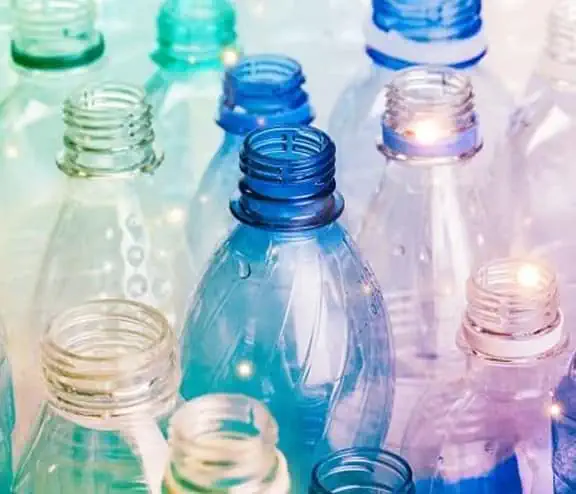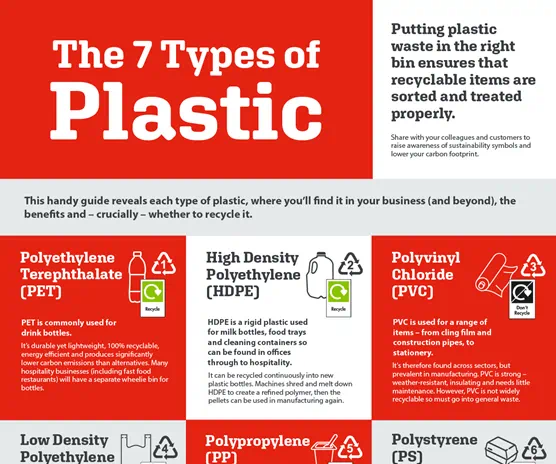
What plastics can I recycle?
If your colleagues and customers know which plastics can be recycled, the overall sustainability of your business will improve. This has many benefits, from attracting eco-friendly talent to meeting rapidly evolving customer needs.
We all encounter plastic in the workplace – from food packaging to office equipment. You may even manufacture or sell a plastic-based product. There’s no ‘one-size-fits-all’ – but a lack of awareness about the different types of plastic material, can lead to confusion over what can be recycled. This can then lead to contamination which affects our ability to recycle what’s been placed in the recycling bin.
We have created a handy guide that clearly states the seven different types of plastic, their common uses, and whether they can be recycled. Share with your colleagues and customers so they can make informed choices around the plastic and what can be recycled. Download and print the guide to display in the office or email the link – every little helps.

7 types of plastic
Three facts about plastic
We interact with plastic every day – in our workplace, in our homes, and every city we commute to or visit. But there’s still a significant knowledge gap when it comes to plastic. Our experts have come together with the three fundamental things you need to know about recycling in the UK.
1. Not all plastics are a problem
There are some problems with plastic. We are producing more virgin plastic than ever, demand has never been higher, not everything can be recycled, and the UK can't process the volumes of recyclable plastics being generated. But not all plastics are a problem.
Plastic is complicated, plastic can be controversial, but plastics perform essential functions in our society. From preserving our food to keeping our medical equipment sterile. When plastic is done properly, it can be a sustainable solution and forms a valuable part of the circular economy. But everyone needs to come together for plastic to work.
We know this because we have spent years developing a solution for milk bottles, allowing materials to be recycled and transformed into new products. Through working with dairies, retailers, government departments, and regulatory bodies, we have worked together to create a closed-loop system where 80% of high-density polyethylene (HDPE) milk bottles in the UK contain Biffa recycled plastic. Our case study shows that when partners at every stage of the product lifecycle work together with regulatory bodies, a solution can be found which results in higher levels of recycling more sustainable waste management.
We don’t yet have a recycling solution for all types of plastic. Flexible clear plastic, or plastic film, is one of the major sustainability challenges facing us as a society. It cannot currently be recycled at scale, it contaminates easily, and is a source of pollution.
There is no short-term solution for using plastic wraps and film. Change needs to happen across the entire supply chain, every household, and every business in the UK. Our current advice is to avoid contamination of recyclable plastics with film and ensure film and other types of non-recyclable material are disposed of in general waste. Wherever possible, we process these types of plastics to extract low-carbon energy.
2. Not all plastics make the food grade
Food grade plastics refers to packaging that is suitable to come into direct contact with food. This type of packaging must pass a higher grade of testing to ensure that it is up to the regulation health standards we have in the UK. In 2021, RECOUP recorded a collection rate of 61% of all plastic bottles in UK households, however UK HDPE milk bottles are typically made up of 30% recycled content. This discrepancy between recycle plastic and recycled content in containers shows that valuable food grade plastics are lost to the UK economy.
The main cause is that more food grade containers need to be recycled. When recyclable food grad plastic is disposed of, there is less less plastic feedstock and producers have less raw materials to make new products. In addition, the UK faces tough competition from Europe for plastics such as HDPE. Many EU economies use the UK as a source of high quality food grade HDPE; this impacts our ability to create new products from recycled material, increasing the need for virgin plastics.
Not all food grade plastics are as versatile as HDPE. Yoghurt pots, sauce bottles, and certain butter and spread containers are commonly made from Polypropylene (PP). Even though this plastic is widely recycled, it cannot be reused as food grade plastic. Even though the plastic can be recycled (often referred to as “downcycling”), the original needs to be replaced with virgin material.
A circular economy for UK food grade plastics is possible, however we need investment in infrastructure. This will enable us to increase the level of recyclable materials that makes up our food packaging. To do this, more recycling facilities are needed. We are consulting with the UK Government on potential developments to infrastructure, but this is a long-term solution.
Our Polymers facilities are equipped with the technology to cope with a mix of plastics. We are careful to separate out non-food grade as it is a valuable resource for other recycled products. If non-food grade plastics enter the processes, it can lead to whole batches being unsuitable for food and drink containers. We go to great lengths to ensure the highest quality food grade plastic is available to UK producers.
Reducing, reusing, and recycling can take complex infrastructure and engineering, but it's only as good as the containers we put in. The best way to protect food grade plastics in the UK is to avoid contamination before it is put into the bin. This is something we can all play a part in now.
3. Pre-cycling improves recycling
Contamination is one of the biggest disrupters to plastic recycling. It wastes valuable UK resources, raises our carbon footprint, and increases the cost of recycling for everyone. Almost all contamination occurs before waste is collected. If a plastic container is contaminated, then it cannot be processed for recycling. For example, if a damaged bottle of cooking oil is place in a recycling bin, it can spread to the other containers, ending up in whole loads of plastic being wasted.
The only way to avoid this type of contamination at the scale required is for people and businesses to get involved in pre-cycling. Pre-cycling means emptying any unused content, cleaning away residue, then putting the waste in the correct recycling bin. If everyone does the pre-cycling, it means the UK can recycle more plastic at higher quality.
If all waste has been pre-cycled, we can recycle more and protect more UK resources. The recycling service provider will use less energy and water to process and clean containers, making a smaller carbon footprint. Most importantly, it’s safer for those people working on the front line collecting and sorting recycling.
Reducing, reusing and recycling more involves everyone in the UK. Understanding what plastics can be recycled and which need to go in general waste is an action we can all take. Read our guide explaining what all the recycling symbols mean to boost your workforce’s recycling knowledge and tackle your business’ waste management.
